How Long Does a Mosquito Live in Salt Lake City, UT?
Most people know mosquitoes are annoying, but they can also be dangerous. Mosquitoes can transmit diseases like malaria, yellow fever, and Zika virus. This blog post will explore how long a mosquito can live and what factors affect their lifespan. We will also discuss some ways to prevent mosquito bites and the spread of disease.
Mosquitoes are small, flying insects that are found all over the world. They have slender bodies and long legs. The female mosquito has a proboscis, or mouthpart, that she uses to pierce human skin and suck blood. Male mosquitoes do not bite humans; they feed on plant nectar.
The lifespan of a mosquito depends on several factors, including the species, the environment, and the season.
Depending on the Species
There are over 3,000 species of mosquitoes, and their lifespans vary. The common house mosquito (Culex pipiens) can live for 10-60 days, while other species, such as the Asian Tiger Mosquito, have an average lifespan of between 30 -40. Female mosquitoes live longer than their male counterparts. The males only survive a week while the females can go up to one month! Female mosquitoes live longer because they need more time for their eggs to develop, while male mosquitoes die shortly after they mate.
The Environment
The environment also plays a role in how long a mosquito can live. For example, if the temperature is too cold, mosquitoes will not be able to survive. Most species of mosquitoes can only live in temperatures above 50 degrees Fahrenheit. In addition, mosquitoes need water to lay their eggs.
Environmental factors like temperature, humidity, and the availability of food sources all affect how long mosquitoes live. Reducing these environmental variables-for example, by using a dehumidifier or removing standing water-can be an important part of controlling them!
The Season
Mosquitoes are more active in the summer when the weather is warm and humid. At very high temperatures like those experienced during summer warm spells, they only survive for about 12 days before dying off completely; but with more comfortable seasonal conditions, such as cool and comfortable summers, mosquitoes can live 130+ days! However, in the winter months, mosquitoes enter a dormancy called diapause. Some mosquitoes can overwinter and live for several months without feeding, allowing them to survive out of sight for 6 to 8 months.
How Long Does A Mosquito Live Indoors?
Indoor environmental conditions can also affect how long a mosquito lives. For example, if it’s too hot or too cold, the mosquito will not survive. In addition, if there is not enough humidity, the mosquito will not be able to lay its eggs.
While it is true that mosquito populations are generally smaller indoors than outdoors, some mosquitoes can survive and even thrive in indoor environments. One reason is that mosquito eggs can be deposited in indoor areas, such as potted plants or standing water, and hatch into larvae that can then develop into adults. Additionally, some adult mosquitoes can live indoors for several weeks if favorable conditions, such as high humidity levels. As a result, it is important to take steps to prevent mosquito breeding indoors, such as emptying standing water and using mosquito nets or indoor mosquito repellents.
How to Prevent Mosquito Bites?
The best way to prevent mosquito bites is to avoid areas where they are found. However, this is not always possible. If you must go into an area where mosquitoes are present, these are some things you can do to protect yourself.
Wear long-sleeved shirts and long pants.
Mosquito repellents containing DEET, picaridin, oil of lemon eucalyptus, or IR3535 are effective. Always follow the product label instructions.
Use air conditioning or window and door screens to keep mosquitoes out of your home. You can also use mosquito fogger once in a while. Mosquito foggers are safe for use around the home, as long as you follow the directions on the label.
Mosquitoes need water to complete their life cycle, so they lay their eggs in containers, ponds, puddles, or other sources of stagnant water. Eliminate standing water around your home, including in flowerpots, gutters, toys, pools, birdbaths, and pet bowls.
Coils and nets can help reduce mosquitoes indoors.
Prevention is the best way to avoid mosquito bites. However, if a mosquito bites you, there are some things you can do to relieve the itchiness and swelling.
- Apply a cold compress: Applying a cold compress to the bite can help reduce swelling and itching.
- Take an antihistamine: If you have a severe reaction to the bite, you may want to take an antihistamine.
- Apply a corticosteroid cream: This can help reduce itching and swelling.
- Clean the bite: Wash the area with soap and water to prevent infection.
As you can see, you can do several things to control mosquitoes and prevent mosquito bites. You can enjoy your summer without worrying about these pesky insects by taking these steps!
Related Articles
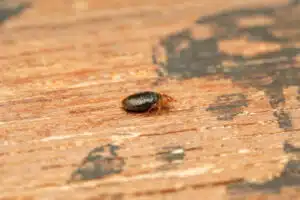
Tick vs. Bed Bugs: Differences and Similarities
Understanding the differences between two common blood-sucking pests, ticks and bed bugs, is important. We want to make sure you know exactly what kind of pests you’re dealing with,
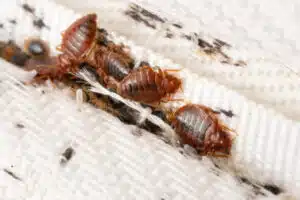
Where Do Bed Bugs Come From, and How to Prevent Them? A Guide for Salt Lake Residents
Bed bugs can be a major nuisance and cause various physical and emotional problems, including skin irritation, anxiety, and sleep disturbances. In Salt Lake City, bed bugs are a growing concern, especially in apartment buildings, hotels, and other high-density living spaces. But where do bed bugs come from, and how can you prevent them from infesting your home or property?
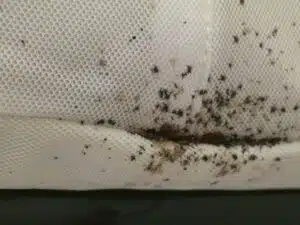
Are All the Tiny Black Bugs in My Bed Bed Bugs?
Sleeping is one of the things that we look forward to after a very long day. We recharge ourselves by sleeping by the end of the night to be refreshed the next day. But we can be disturbed even during our sleep by pesky pests crawling and hiding where we sleep. That’s terrifying, right? Pests that are known to annoy us during our sleep are bed bugs. They are usually found where humans and other pets sleep. Bed bugs can be almost anywhere in the world – even in your Saltlake home! They can be annoying because they suck your blood and leave you with an itch and bumps in the infected area. So blood attracts them, even the blood of other animals. Therefore, you should conduct bed bug removal if you have them. If you find bugs on your beds, you might think they are bed bugs. But are they?
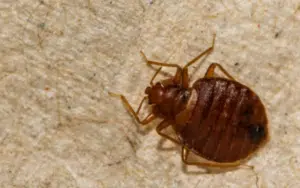
Can Bed Bugs Live in Your Car?
Bed bugs are small, flat, and oval-shaped insects that feed on the blood of humans and animals. During the day, bed bugs hide in cracks and crevices around beds, furniture, and baseboards. You can also find them in mattresses, bed frames, blankets, carpets, and other fabric items throughout your home. While it is possible for bed bugs to infest your car, they’re less likely to do so than inside a house or other structure.
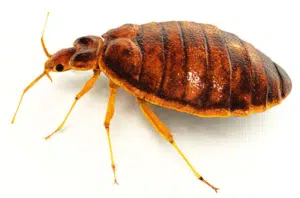
How to Find Bed Bugs in Your Home
Bed bugs are small, blood-sucking that feed on human and animal blood. They belong to the family Cimicidae, contain over 100 species, and have been around for millions of years.

Can Bed Bugs Jump?
Bed bugs are a common household pest that can be difficult to get rid of. These tiny insects can live in any crevice or crack in your home and feed on blood.
